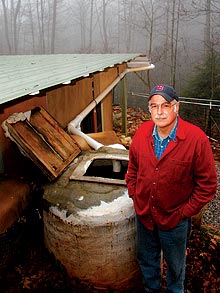Whenever there’s a storm, Geoffrey Stone pays close attention to how many inches of rain we get. And he’s sure to take note when the forecast calls for cloudy days. That’s because Stone, who lives with his wife, Susan, at Earthaven Ecovillage near Black Mountain, relies upon the sun and the rain even more than most of us. Their home is an earthship, made of old tires encased in stucco. It features a passive-solar design, solar panels for electricity and hot water, and a catchment system that provides water for laundry, bathing, flushing toilets and washing dishes. Their drinking water is pumped from a nearby spring.

Western North Carolina crept into exceptional drought this past year, the driest on record statewide. Nonetheless, says Stone, his personal water supply held up fine. “I’m very proud to say that,” he reveals. The household, he figures, uses about 20 gallons of water per day—one-tenth of what an average American household consumes.
On this particular morning, a patter of raindrops quickly turns into a downpour. The water flows down the earthship’s sloped metal roof and into a gutter; from there, it’s piped into twin cisterns on opposite sides of the house. Together, the concrete containers hold 1,600 gallons (they’re also home to tiny fish that eat mosquito larvae). The water is fed through a series of filters before being used.
Inside, the sinks and shower function like the ones in any typical household, thanks to a set of pumps and an on-demand water heater (which supplements the rooftop solar panel). “Our objective is to live our values and to demonstrate that we can live comfortably and sustainably,” says Stone. Using potable water to flush a toilet is senseless, he maintains.
And while Stone acknowledges that building a cistern from scratch, as he did, is labor-intensive, he believes this kind of do-it-yourself system is within reach of anyone who’s determined to try it. Meanwhile, virtually anyone can implement less-complicated conservation measures, he says, gesturing toward a sizable plastic rain barrel that’s quickly filling up. “That’s a no-brainer,” Stone declares, explaining that the unfiltered contents are used to water plants.
The Stones are clearly ahead of the curve when it comes to implementing water-conservation strategies. But as Western North Carolina continues to contend with drought (albeit less severe than several months ago), the general awareness concerning water resources seems to be on the rise. Consider, for instance, the comments submitted to RiverLink by people planning to attend the nonprofit’s upcoming Community Drought Forum. “For humans, necessity is the mother of invention,” one wrote. “The drought has awakened us. We should practice water management even in times of abundance. I want to help.”
Another registrant had this to say: “Our current drought is not an isolated event. We need to prepare for more of the same. Our land-development policies must recognize that our water resources are limited.”
The Feb. 22 event is free, notes Education Coordinator Kathryn Blau, and everyone is welcome to attend. “We felt that the general public was being left out of the discussion, so that’s why we wanted to make it a community drought forum,” she explains. Besides providing information about how the drought is impacting the French Broad River watershed’s environment and economy, the event aims to raise awareness about homeowners’ options for conserving water. Vendors will be on hand with rain barrels and other water-saving devices. The half-day gathering will feature speakers from Duke University’s Nicholas Institute for Environmental Policy Solutions, Altamont Environmental, the N.C. Wildlife Resources Commission, the USGS N.C. Water Science Center, the N.C. House of Representatives and others. There will also be a panel discussion featuring elected officials. “We have invited pretty much all city council members, mayors and state representatives from all the municipalities in the watershed,” says Blau.
RiverLink’s Community Drought Forum is slated for Friday, Feb. 22, from 8 a.m. to 1 p.m. in A-B Tech’s Ferguson Auditorium. Early registration is encouraged. Visit www.riverlink.org for more information.


I think people who do this kind of thing are to be admired. That said, there is too little attention to smaller steps each one of us can do. Example – I work out at the YMCA frequently and shower there. I am the only one I’ve ever seen who does a “Navy shower”. Wet, turn off water, soap up good, rinse. The norm is long showers and wasted water. In the meantime, our membership rates keep climbing. Hello, people, it’s not that the Y is spending more money on services to poor kids, it’s that the water and energy we waste is more and more expensive! They might have more money for poor kids if we weren’t so greedy and wasteful.
I thought a navy shower was just putting on deoderant!
Nice article, it’s great to recognize people who are making a difference. I think that it won’t be long until humans are fighting wars over water like we now are over oil and other resources.
Another step we can take is to pay attention to how much water is used by our diet. Cornell University scientist David Pimentel has shown that “producing a pound of animal protein requires, on average, about 100 times more water than producing a pound of vegetable protein.” Even more remarkable is the amount of water required to produce milk. The 2006 UN report “Livestock’s Long Shadow” notes that, “On average 990 litres of water are required to produce one litre of milk.”